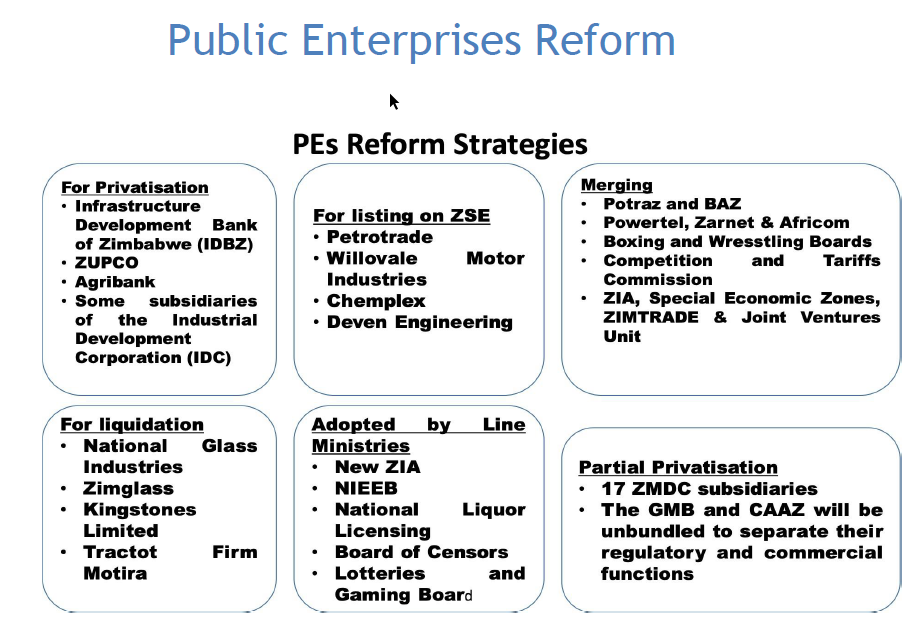The minister of Finance, Professor Mthuli Ncube published an update to his Transitional Stabilisation. You’d be forgiven for forgetting the document even exists as it has been somewhat muted. Not such a bad thing as what Zimbabwe needs is work on the ground. Which according to the TSP update, it is delivering. There is not much new information in the update, another good sign. Among the highlights are Doing Business reforms, the New Venture Capital Company, Exchange rate stabilisation and Public EnterprEnterprises.
New Venture capital Company
The New Venture Capital fund is a ZWL$500 million (approximately US$6 million) fund that has been established to support youth-led and women-owned start-up businesses. At this point little is known and it would be easy to critique the mouthful of words explaining the fund. We would have to wait for further detail to understand the idea fully. In principle it is good but factors such as investment limits and terms may plague the idea as has happened with others in the past.
Exchange Rate Stabilisation
While the government continues to herald the curtailing of mobile money and other tools that were being taken advantage of by the parallel market it is evident that money supply.is aggressively being reduced in the nation. Over the last few weeks, the exchange rate on the auction market has reached relative stability. Parallel market exchange rates have also settled and the gap between the two has been the lowest we have seen in quite some time. If we were to call this stability a tougher question is on the sustainability of this stability.
Public Enterprise Reforms

The document announced a whole host of Public Enterprise Reform plans that include the privatisation of Zupco and Netone bundled with TelOne, the merging of Powertel and Africom as well as Zimbabwe Investment Authority and Special Economic Zones. Meanwhile, Pertrotrade, Willowvale and Chemplex among others are to be listed on the Zimbabwe Stock Exchange. Moving a fixed-line operator with ADSL as its drawcard in the age of fibre optic internet has proven very difficult for the government. Will bundling it with Net One be the answer?ZSE listing for businesses like Willowvale is long overdue, provided they are run professionally.these are the assets that benefit from private ownership. The bundling of similar services is long overdue. Having your one-stop investment shop and your special economic Zones separated did not make sense.
Doing Business reforms
Zimbabwe has taken the Ease of doing business report very serious for some time now and that is commendable. The focus has largely been on how quickly one can set up a business in Zimbabwe. Past debacles the forced conversion of US dollars to Zimbabwean dollars and the sudden closure of the ZSE should remind us that nobody is in a rush to register a business in a place where you could lose it all. Our worst performance has consistently been in enforcing contracts which is one of the areas the TSP update notes work has been done on through the increase in the number of small claims courts. Perhaps not enough by itself, we shall see the next Doing business report. Some attention was also paid to the ease of doing business across borders.
Budget
Just a quick scan of highlights concerning the budget and overall economy. Zimbabwe still has an unsatisfactory budget transparency rating and work is being through workshops and kiosks to raise awareness on budget matters. Zimbabwe as a country is characterised by information asymmetry and that goes deeper than a few workshops. GDP is set to contract for a second consecutive year thanks to the COVID 19.
5-year plans
The document also two National development plans. These are 5-year plans running from 2021 to 2025 and 2026 to 2030. They will have long term focus. The idea is not entirely new as it was mooted to plan for agriculture in 3-year cycles some.time ago. This, in theory at least, improves on that idea. The specifics of these two NDPs have not been made clear yet. Zimbabweans are of course apprehensive about these plans as we have had many over our short history which has amounted to what we have today. What is clear is that they intend to be based on Integrated Results-Based Management.
The TSP update claims a lot of progress has been made and goes along to prove it. The results on the ground are harder to gauge and this is something that may cause concern for plans. While the ordinary Zimbabwean can feel the change in exchange rate movement there is little else they can feel. This is not to say good work has not been done but rather the meaning of the good work is not evident. The new ideas of the NVCC and the NDPs will be the things to look out for going forward.









Yes indeed… The common man in the street is yet to feel any tangible effects of the stabilisation programme, after their informal businesses were pulled down and prices sky-rocketed with the introduction of the forex auction… Fuel is an immediate example…